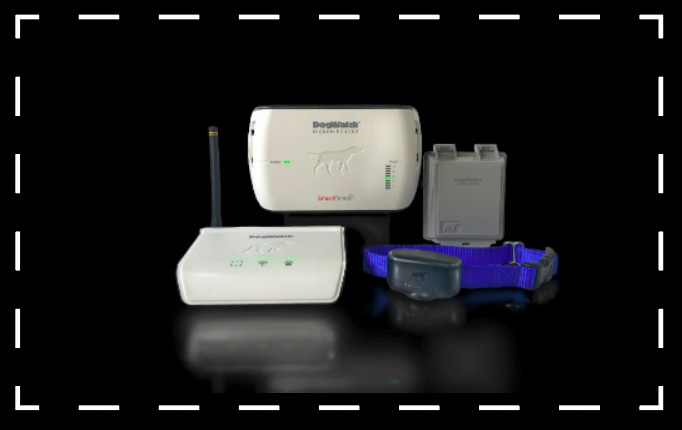There are two basic components to a remote training system: a handheld“transmitter” and a “receiver” which is worn on a dog collar.
The transmitter sends a radio signal to a special receiver on the dog’s collar. The receiver on the collar “communicates” to your dog through a set of two stainless steel posts. The posts are part of the receiver collar and they are in contact with your dog’s neck.
You can use the remote trainer to send a wide range of training messages to your pet. Depending on the training situation, the training message may be delivered as:
- An audible tone or a vibration
- A brief stimulation* (1 second)
- A constant stimulation (up to 8 seconds)
The training message from the dog’s receiver collar can get your dog’s attention or distract him from an unwanted behavior. By obeying your obedience command or by stopping the undesired behavior, your dog quickly learns to avoid and/or stop tone or sensation which is delivered by the receiver collar.
*”stimulation” may also be referred to as “correction”, “training stimulation”, “training correction”, “training signal”; or “shock”
The “stimulation” from the collar is intended to distract your dog by delivering an unpleasant but harmless sensation similar to the static shock you receive after walking across a carpet in your socks.
The BigLeash dog training collar provides you with multiple stimulation levels. Most dog trainers find they can achieve their desired results using a low intensity stimulation, often barely perceptible to humans. All BigLeash models also include an audible signal which allows you to condition your dog to associate the audible tone with the training correction, thus eliminating the need for the stimulation altogether.
The BigLeash with Good Vibrations™ includes both audible and vibration training options.
Always start with the lowest intensity level and work your way up as needed. You will know you have found the proper stimulation level when your dog responds to the stimulation with only a mild twitch or perk of the ears or like you have given him a quick tug on a leash.
Brief stimulation is a quick “attention getter” that lasts only for a fraction of a second, regardless of how long you press the button. This stimulation has been described as feeling like a mosquito bite.
Continuous stimulation is a pulsating stimulation that continues until you release the transmitter button (up to 8 seconds maximum).
In addition to having 10 training levels as well as audible and vibration modes, the BigLeash can be set to “0” stimulation level so that you will not accidentally send a correction when you have the bark control collar on the dog but are not actively using the trainer. Additionally, the BigLeash includes an automatic shut-off feature that limits the continuous stimulation to 8 seconds.
The appropriate age depends on the dog and his readiness for training. Your dog needs to have a basic understanding of what is expected of him and he must understand basic commands. Some trainers recommend waiting until the dog is five or six months old; others will train younger dogs if they understand the basic commands.
Remote trainers are intended for two basic purposes:
To reinforce already-learned desirable behaviors, such as obedience commands. Your dog learns to “turn-off” the unpleasant stimulus by performing the command correctly.
To correct unwanted behaviors, such as digging, chewing, jumping up, etc. Your dog learns to associate the unpleasant stimulation with the unwanted behavior and, therefore, stops doing the behavior.
Remote trainers are not recommended for dogs with a history of aggressive behavior unless being used by experienced dog trainers.
See Training Tips and the Owner’s Guide for more specific training information. There are many books, videos and online guides, which provide additional remote trainer information.
The receiver collar should be worn comfortably snug on your dog’s neck. If it appears that your dog isn’t feeling the stimulation, try tightening the collar strap. Be sure the collar is tight enough for the contact points to reach through the undercoat.
This is probably a skin irritation from the contact posts rubbing the throat. One of the following has likely happened:
- The collar was on your dog too long. Do not leave the collar on your dog for more than eight hours a day.
- The collar is too tight or too loose. Make sure the collar fits properly. You can position the collar probes in different locations along your dog’s neck to help avoid skin irritation.
Yes – please do.
The duration of the battery charge depends on how you use the collar. If the collar is used intermittently and turned-off when not in use, the battery charge will last longer than if corrections are made frequently and/or the collar is left on when not in use. For best results, we recommend charging the collar when it is not being used – preferably every night. Frequent charging will not damage the battery or shorten the duration of the charge or the life of the battery.
- Hidden Fence provides a 2 year limited warranty on the transmitter and receiver for both parts and labor from the date of purchase.
- Hidden Fence provides a 1 year warranty on parts and labor for batteries from the date of purchase.
- Accessories such as chargers and splitter cables carry a 1 year warranty.
- Warranty does not cover repairs or replacement due to misuse by the owner or dog, improper maintenance or lost units.
- Water damage on transmitters that are “water resistant” is not covered under warranty and subject to repair charges.
- The warranty is void if the unit has been altered or an unauthorized person has attempted repair work.
- Warranty is non-transferable.
No. Our remote trainer uses a unique code programmed for each collar. The training collar must be “married” to a specific transmitter in order to receive the signal.


